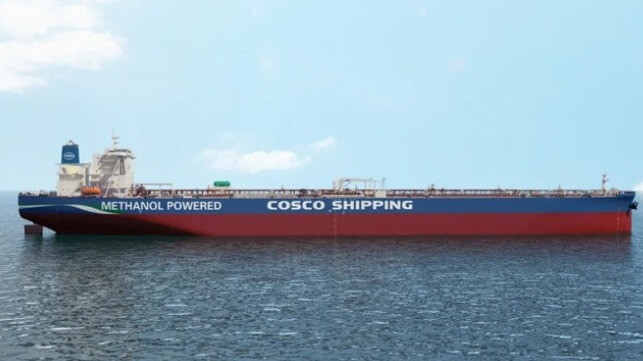COSCO and China Merchants Exploring Methanol Fueled Ships

Methanol is continuing to gain momentum as a leading option for the shipping industry to address decarbonization. Already adopted by an emerging group of shipping lines, two of China’s leading shipping companies are joining the effort focusing on methanol for their future fuel choice.
During a meeting discussing the industry’s energy transition, the chairmen of China Merchants and COSCO Shipping Bulk announced that their companies will focus on Methanol marine fuel as their primary area of research in the future. CMES chairman Xie Chunlin and Gu Jinsong, Chairman of COSCO Shipping Bulk made the comments in a meeting held in late August according to the Methanol Institute, during which the two reviewed the cooperation between their companies and exchanged views on the shipping industry’s low-carbon transformation.
The news that the Chinese companies plan to focus on methanol follows previously reported efforts by COSCO to develop shipping using the alternative fuel source. COSCO Shipping Energy Transportation and Dalian Shipbuilding Industry Company (DSIC) reported in February that they had received design approval for China’s first domestic methanol dual-fuel VLCC. The design calls for a 310,000 dwt VLCCs equipped with two methanol fuel tanks with a total of 10,000 m³, which would give the vessel range of 2,3000 nautical miles.
Previously, several government ministries have referenced low carbon and renewable methanol development from green hydrogen and methanol-fueled vessels as key enablers for the country’s policies to decarbonize the shipping industry noted Kai Zhao, Chief China Representative for The Methanol Institute. “That places methanol at an entry point on the transition curve where two leading Chinese companies can reduce GHG emissions and achieve carbon neutrality in the longer term.”
The Methanol Institute welcomed the comments made by the chairmen of China Merchants Energy Shipping and COSCO Shipping Bulk supporting methanol noting it is part of a growing trend for the alternative fuel. The attention coming from the China Merchants Group they noted is especially encouraging as the company is the second largest among non-financial shipowners worldwide with its fleet and pending newbuild orders totaling 315 ships equivalent to 44.6m dwt. COSCO Shipping Bulk operates a fleet comprising some 400 bulk carriers, equivalent to nearly 40m dwt.
“China is already a leader in production of renewable energy and the shift towards methanol long term is in step with its decarbonization ambitions,” says Chris Chatterton, Chief Operating Officer, The Methanol Institute. “The shipping industry can’t wait for fuels that may be decades away from approval and availability; shipowners need a place to start in making carbon savings and Methanol can provide that transition now.”
They noted that in the past year that Maersk, CMA-CGM, and X-Press feeders each placed orders or increased their commitments for methanol newbuild vessels. Companies including Waterfront Shipping, Stena/Proman, NYK, and MOL have also built methanol carriers that use a segregated portion of the cargo as fuel.
With more bulk shipowners exploring methanol as fuel, the Institute also highlights that this year has seen methanol/dual-fuel designs for bulk carriers and tankers coming to market. Main engine makers report full order books for new units and increasing interest in retrofits and conversions of existing engines.
According to data from DNV’s Alternative Fuel Insight, today less than one percent of the worldwide shipping fleet operates on methanol. They report that there are currently 62 ships either in operation or on order that use methanol out of a worldwide fleet of nearly 6,800 ships. Methanol is currently used mostly by oil and chemical tankers although the new orders came from container shipping.
